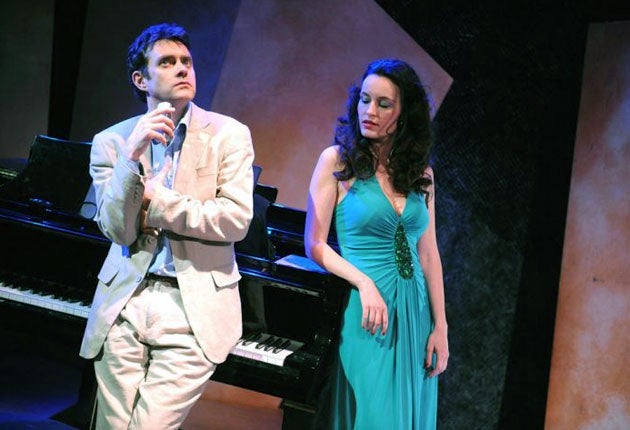Water's Edge, Arcola Theatre, London; Damascus, Tricycle Theatre, London
As the bombs fall the drama fades

Your support helps us to tell the story
From reproductive rights to climate change to Big Tech, The Independent is on the ground when the story is developing. Whether it's investigating the financials of Elon Musk's pro-Trump PAC or producing our latest documentary, 'The A Word', which shines a light on the American women fighting for reproductive rights, we know how important it is to parse out the facts from the messaging.
At such a critical moment in US history, we need reporters on the ground. Your donation allows us to keep sending journalists to speak to both sides of the story.
The Independent is trusted by Americans across the entire political spectrum. And unlike many other quality news outlets, we choose not to lock Americans out of our reporting and analysis with paywalls. We believe quality journalism should be available to everyone, paid for by those who can afford it.
Your support makes all the difference.Outside the hotel lobby where Damascus takes place, bombs are exploding and survivors wailing. But inside the loudest sound is the ticking of the biological clock. The receptionist, Zakaria, is desperate to become a wealthy screenwriter and sleep with Western women. The rest of the cast are frustrated, too. Paul, the Scot trying to sell a textbook for students learning English, is told it is culturally insensitive. Wasim, the dean of an important college, is thwarted by Muna, his deputy and former lover. Elena, the Ukrainian lounge pianist, complains of the clientele, for whom she must play Europop not Messiaen.
All this resentment and repression should produce a fair-size blast. But David Greig's drama fizzles out in the second act, its chorus of whimpers ending with a half-hearted bang. Damascus, the hit of the 2007 Edinburgh Festival, and now embarking on a world tour, grew out of a series of playwriting workshops in the Middle East, but it might have been written beforehand, as an example – of what not to do.
For instance, characters should be more than just types. Paul is the innocent abroad, Muna the displaced and Westernised Middle Easterner. Zakaria is the pest we have all tried to duck. It's also preferable to show rather than tell. Paul discovers Syrian attitudes about materialism and respect for elders from a long speech by Muna, not direct experience. And, so many years after Chekhov's maxim that a gun shown early in a play must be fired by the end, it might be a good idea to treat this as advice, not holy writ.
Anthony MacIlwaine's set, with plish-plashing, star-shaped fountain, is a clever one, but Philip Howard's cast are only adequate, except for Alex Elliott's Wasim. A French-speaking intellectual whose energies have been diverted to intellectual politics, Wasim bristles with manipulation and malice. If he cannot sleep with Muna, he will pimp her. But Greig seems unaware of this irony, as well as of the reactions of women in the audience. The boyish Paul's attempted seduction of Muna is an unpleasant combination of betrayal (he's married), pleading, exploitation, and male-bonding. Before Greig sets off on another trip, he might try learning more about the foreign tribes closer to home.
American playwrights have never been shy about mixing the mythic and the mundane. Neil LaBute does it, and now Theresa Rebeck, nearly 80 years after O'Neill, in Water's Edge, sets the return of Agamemnon in New England. But, by failing to respect both the ancient and modern worlds, she ends up with a play that is not so much a healthy hybrid as a dog with the head of a sheep.
Rebeck apparently sees the Greek myths as an episode of Friends several thousand years before its time. In this version, Richard comes back to his soft-spoken ex-wife (Helen), fierce daughter (Erica), and mollycoddled son (Nate) after fourteen years' of unspecified wealth-gathering. The no-name lover isn't in the picture, but, like the ill-fated Greek, Richard brings his concubine (Lucy) along. Helen and her children are bitter about his part in the drowning of another daughter. But, despite the ominous presence of a bathtub on the front lawn, the drama that emerges from this tense situation is, like Fiona Morrell's production, hesitant and anemic. The dialogue is either sour-snippy, cute-confessional, or phony-grandiose. Robert Cavanah's Richard is far too laid-back and uncertain for a tycoon, and Mark Field's Nate is aggressively inarticulate, rushing like a mad bull at an anacoluthon.
It's a relief from this over- and under-acting to watch Madeleine Porter, as Helen, be reserved and sardonic. But, despite her mesmerising beauty, she lacks sensual threat. As Lucy, Kate Sissons is appealing and sympathetic, but too blithely resilient. Neither real American nor real Greek, The Water's Edge ends up a sea battle in a bathtub.
'Damascus' is on until 7 March (020-7328 1000). 'Water's Edge' is on until 28 February (020-7503 1646)
Join our commenting forum
Join thought-provoking conversations, follow other Independent readers and see their replies
Comments